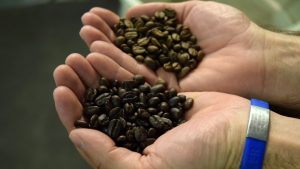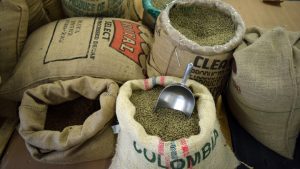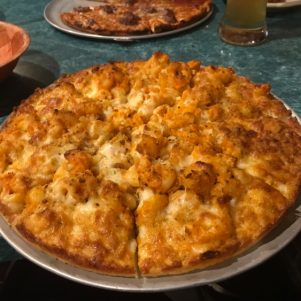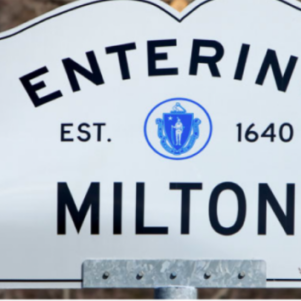Boston roasters renew city’s coffee obsession
By Kara Bettis | May 2, 2016, 5:00 EDT
 Boston Common Coffee Co. owner Peter Femino removes beans from the roaster to cool at his roasting facility in Hopedale. (New Boston Post photo by Kara Bettis)
Boston Common Coffee Co. owner Peter Femino removes beans from the roaster to cool at his roasting facility in Hopedale. (New Boston Post photo by Kara Bettis) BOSTON – One more day in Boston, one more coffee shop. National roaster La Colombe opened its first Boston café Thursday near South Station. It’s one more shop in a city with a coffee obsession that dates back to the colonial era.
One might think that another coffee shop can’t survive in “Beantown,” the birthplace of Dunkin’ Donuts. But in fact, experts say, Boston is really at the cusp of another kind of coffee trend, one that focuses on a sensory, interactive experience with a single cup of coffee that puts quality over quantity.
Call them coffee snobs, but the men and women at the forefront of this wave of micro roasting, as it’s called, are pioneers – having spent decades attempting to influence a new coffee culture and change the New England sensibility that often relies on a “regulah” cup with plenty of cream and two sugars.
The history

Boston Common Coffee Company owner Peter Femino shows the difference between a darker roast and a medium roast. (New Boston Post photo by Kara Bettis)
After George Howell, considered the pioneer of the modern roaster trade in New England, opened his first Coffee Connection in 1974 in Harvard Square, it blossomed into a 24-store chain that some likened to the nascent Starbucks operation in Seattle. But in the early 1990s, Howell sold his company to the rapidly growing chain from the Pacific Northwest, disappointing some loyal Hub patrons.
The sale left a gap in retail shops serving espresso-based drinks and what the industry calls “single-origin” coffees, or varieties made from one type of bean from a single location – whether a farm or region or country.
While coffee shop chains in Seattle and other West Coast cities expanded rapidly, in New England the market cooled for about a decade. Several shops stepped up efforts to fill the gap left by the Coffee Connection, including Red Barn Coffee Roasters and Barrington Coffee Roasting Co.
“Boston in the past few years is waking up to the experience of what a beautiful coffee can mean in your day,” Barrington owner Barth Anderson said. He has been roasting beans since the mid-1980s, and in 1993 began a shop in the Berkshires town of Lee which has grown to a seven-store chain. It’s latest venue opened in the South Boston Seaport District.
Anderson acknowledged the challenge of competing with an entrenched juggernaut, though.
“The Dunkin’ Donuts experience is still a huge, huge experience for people in Boston,” he said.
So, what’s all the fuss about?
Locally roasted
Small-batch roasters “can control the quality a little more carefully,” said Jeff Chatlos, a co-owner of Flat Black Coffee Co. For coffee lovers, he said, “that’s the draw.”
Started in Dorchester 14 years ago, the company has grown to six locations, mostly downtown. The shops specialize in “exquisitely roasted coffees from rare places on earth.”

Various South American green, unroasted coffee beans sit in burlap sacks waiting to be roasted at the Boston Coffee Company in Hopedale. (New Boston Post photo by Kara Bettis)
“These are really fine coffees,” Chatlos said. “Each roaster puts their stamp on it – what they think the best roast for that coffee is.”
Flat Black’s “stamp,” he added, is what he’s nicknamed the “Goldilocks roast – ‘not too dark or too light but just right.’”
It’s not just the roast that matters, but the coffee bean. Single-origin coffee is a batch that comes from the same location – often, grown in an African or South American country. Like wine, the climate where the bean is grown influences its flavor.
“Even processing of coffee contributes to ultimate flavor of bean, whether it’s washed or dry processed,” Chatlos, 48, said. “When the roaster knows these things they know how to roast each single-origin coffee in order to really highlight those characteristics.”
Gracenote Coffee Roasters, which has one store in Boston’s Leather District near South Station, took its name from the musical world with a playful twist on the accents that can be found in coffee flavors.
“We taste plum, or caramel, or jasmine, or peach, or whatever. We also taste coffee,” the roaster explains on its website. “What separates coffee from good coffee from great coffee are often those notes, and how well they work together.”
Even latte art, the decoration of milk on the surface of a espresso drink, can suggest the quality of the drink’s preparation and texture.
“It’s a visual representation of a set of qualities that are really hard to achieve,” Anderson said.
For Boston Common Coffee Co. partner Peter Femino, the ideal roast comes from a balance of both the art of achieving a certain taste and the scientific process. His roaster in Hopedale fills its building with the aroma of crackling, roasting beans. The processor is neatly organized, dividing raw beans by country of origin and lining up finished beans by blend, roast and origin.
Femino said amenities like couches and Wi-Fi connections in stores can play an important role in the Hub market.
“If you don’t offer those things, you can’t compete,” said Femino, who launched his first shop in 2004 and began roasting beans in 2005. “Coffee’s not ‘just coffee’ anymore.”
His company also takes pride in its ability to offer both freshly roasted and brewed coffee and fresh-baked pastries, something that fewer shops attempt to juggle. The company has four locations – the most recent opened on Canal Street near North Station.
Red Barn co-owner Mark Verrochi is another modern coffee pioneer who can recall customers quizzically asking if the espresso machine is what roasted the coffee. The Upton-based business now has seven cafés, with the first dating back to 1997. Offering locally roasted, medium-bodied beans on a wholesale basis snagged a competitive edge for the company, Verrochi said.
Now, Boston is “discovering quality coffee, and micro roasters are now sprouting up like weeds,” Verrochi, 57, said.
But it’s no easy task, attempting to change an entire culture that has grown up around Dunkin’ Donuts, even if the dominant retailer helps expand the coffee market. Dunkin’ defined the coffee shop in Boston and the region for decades after its post-war beginnings in Quincy.
“The customer base is different in New England,” Verrochi added. “The Dunkin’ cult is unimaginable.”
Teamwork, or competition?
Although the experts see that their work is just beginning, a consumer unfamiliar with this world might be quickly overwhelmed – there are dozens of “local” coffees shops just in downtown Boston alone.
In addition to these roasters, there’s also Fazenda Coffee Roaster in Dedham and Jamaica Plain, Somerville’s Barismo, and Mystic Coffee Roaster in Medford, to name a few. Counter Culture coffee, a Durham, North Carolina-based company, opened a regional training center in Somerville in 2012.
Many roasters said what differentiates them from rivals are the types of coffee they offer, other services or options – such as pastries or food – or a certain ambiance. Some list their careful attention to the quality of the bean and the brew.
“We want customers to just focus on aromas, taste, peaceability, explore sensory experience and have pleasant experience with other human beings,” Anderson said. “We don’t do soups, salads, or sandwiches. We keep it really simple because we want to help people explore a new sensory experience.”
Still other roasters said their retail and wholesale business help make them successful. It’s not just area cafés and restaurants that buy their coffee wholesale – multiple roasters said they sell to breweries, chocolatiers and other specialty businesses.
La Colombe, for example, offers a “draft latte” – frothed milk and cold-pressed espresso drink served cold on tap from its Atlantic Avenue shop near South Station. It doesn’t provide Wi-Fi service, in a move calculated to encourage customers to enjoy a “more authentic coffee experience,” according to a statement.
While competition can be challenging, Chatlos said that more coffee shops and choices is healthy and serves to expand the market for locally roasted beans.
“People are developing better tastes because they now have that opportunity,” he said.
Anderson agreed: “The last thing we need is to do less. We need to do more.”
He pointed to Seattle, Portland and San Francisco, West Coast cities 20 years ahead of the East Coast in terms of providing high-end coffee. Those cities are similar in size to Boston yet seem to have more local roasters.
“In Boston it’s just starting to be cultivated and not be a rarity,” Anderson said. “Which is helpful because we help each other. We can’t be everywhere all the time.”
“Is it a hard path? Yeah,” he concluded. “But when there’s a match – the customer has a coffee experience, it’s an epiphany for them. What a cup of coffee can taste like. That is really what it’s all about.”
Contact Kara Bettis at [email protected] or on Twitter at @karabettis.











